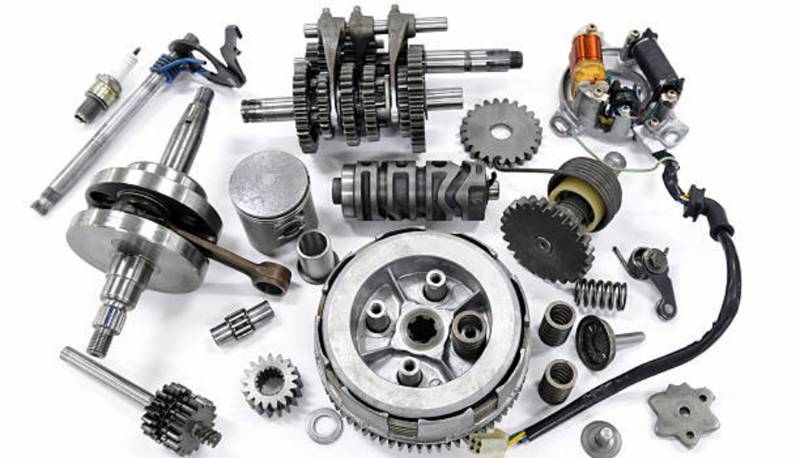How Proper Motorcycle Spares Christchurch Maintenance Affects Safety and Performance
How Proper Motorcycle Spares Christchurch Maintenance Affects Safety and Performance
Blog Article
Discover the Vital Motorcycle Parts You Required for Optimum Efficiency
Understanding the vital parts of a motorcycle is essential for accomplishing peak efficiency. Each part, from the engine to the braking system, plays an essential function in total functionality and security. Routine upkeep can prevent unexpected failures and improve the riding experience. Nonetheless, numerous motorcyclists forget the intricacies of these systems. Uncovering just how they collaborate can lead to a more efficient ride. What crucial components should every rider prioritize?
The Engine: The Heart of Your Motorbike
The engine functions as the core component of a motorcycle, driving its efficiency and specifying its abilities. It is in charge of transforming fuel into mechanical energy, which powers the bike ahead. Various kinds of engines are used, consisting of single-cylinder, V-twin, and inline setups, each offering unique qualities suited for various riding styles and purposes. The engine size, generally determined in cubic centimeters (cc), significantly influences efficiency, with larger engines usually giving more power and torque.Furthermore, the engine's design and technology, such as gas shot systems or air-cooling versus liquid-cooling, impact efficiency and integrity. Upkeep is vital for peak operation; factors like normal oil modifications and checking ignition system assurance longevity. Cyclists commonly consider an engine's responsiveness and level of smoothness, as these qualities improve the general riding experience. Inevitably, the engine continues to be a critical component that defines not just the motorcycle's efficiency but also the cyclist's connection to the device.
The Transmission: Moving Gears Efficiently
The transmission plays a vital duty in a motorcycle's performance, specifically in the technicians of equipment moving. Comprehending how to shift gears smoothly can improve the general riding experience, while regular maintenance assurances peak functionality. Appropriate focus to these elements can substantially influence the durability and performance of the motorcycle.

Gear Shifting Mechanics
Smooth equipment changing is crucial for optimal motorbike efficiency, greatly affecting both velocity and control. The mechanics of gear moving include the communication in between the clutch, gear lever, and transmission system. When a cyclist engages the clutch, it disengages the engine from the transmission, enabling for an equipment adjustment without harming the components. A well-timed release of the clutch, combined with accurate motion of the equipment bar, facilitates a seamless change between gears. This procedure ensures that the engine runs within its ideal power band, enhancing performance. Bike Parts Wellington. Furthermore, understanding the gear ratios and their impact on rate and torque can aid motorcyclists make educated selections throughout changes, inevitably contributing to a much more receptive and satisfying riding experience
Upkeep Tips Value
Regular maintenance plays an essential function in ensuring that the transmission system operates efficiently, enabling smooth equipment shifts. Consistently transforming the transmission and inspecting fluid is vital, as old fluid can result in raised friction and wear. Additionally, evaluating the clutch for wear warranties peak involvement and disengagement, protecting against slippage throughout gear changes. Lubrication of relocating parts is equally important to lower friction and enhance efficiency. Motorbike owners should likewise keep an eye on for leakages and uncommon sounds, as these can indicate underlying concerns. By adhering to these maintenance ideas, bikers can lengthen the life-span of their transmission system, ensuring that equipment shifts remain smooth and adding to the general efficiency of their motorbike.
The Braking System: Ensuring Safety And Security on Every Adventure
Braking systems are essential components that directly influence a motorcycle's security and performance. They contain different components, including brake pads, rotors, calipers, and hydraulic lines, all collaborating to assure efficient slowdown. The kind of braking system-- typically either disc or drum-- influences responsiveness and quiting power.Regular upkeep is necessary to promote peak efficiency; used brake pads can result in decreased performance and raised stopping ranges. Furthermore, the top quality of brake liquid should be kept track of, as it can absorb moisture over time, compromising stopping efficiency.Riders need to also consider the relevance of anti-lock braking systems (ABDOMINAL), which prevent wheel lockup throughout abrupt stops, improving overall safety. Correctly functioning brakes are not almost stopping; they infuse self-confidence in the biker, enabling more secure navigating through numerous surfaces. Eventually, a reliable braking system is critical for taking pleasure in every trip with assurance.
The Suspension: Enhancing Convenience and Control
A well-functioning shock absorber considerably adds to a motorbike's overall performance, complementing the efficiency of the braking system. The suspension plays a significant duty in soaking up shocks from irregular surface areas, guaranteeing a smoother ride while preserving tire call with the road. This get in touch with is important for both stability and control, allowing riders to browse corners with confidence and precision.Different types of shock absorber, such as telescopic forks or mono-shocks, supply varying levels of convenience and handling. Appropriately tuned suspension boosts responsiveness, offering the motorcyclist with a much more connected feeling to the motorbike. Routine maintenance checks are essential to identify the suspension components, including springtimes and dampers, are functioning at their ideal. An effective suspension system not just elevates the riding experience but additionally adds to the durability of other motorbike parts by lessening damage. Consequently, purchasing quality suspension is essential for any type of significant motorbike enthusiast.
The Tires: Attaching You to the Roadway
Tires play an important function in a motorcycle's performance, serving as the primary web link between the cyclist and the roadway. Comprehending the different kinds of tires readily available can substantially influence handling and safety and security. Additionally, routine upkeep is important to assure peak tire performance and long life.
Tire Types Explained
Exactly how do various tire types affect a motorcycle's efficiency? Tire kinds play an important duty in establishing a motorcycle's stability, handling, and grasp. Sporting activity tires, designed for high efficiency, deal boosted grip and responsiveness on smooth roads, making them suitable for racing and aggressive riding. Alternatively, exploring tires focus on durability and comfort, giving a smoother experience for long-distance travel. Off-road tires, characterized by their sturdy step patterns, stand out in traction on unpaved surfaces, appropriate for experience fanatics. Furthermore, dual-sport tires mix qualities from both on-road and off-road categories, providing to functional riding requirements. Ultimately, choosing the right tire kind is essential for maximizing efficiency, ensuring safety, and improving the total riding experience.
Upkeep Tips Offered
While riding when driving, maintaining optimal tire problem is vital for safety and efficiency. On a regular basis checking tire stress is very important, as under-inflated tires can result in inadequate handling and boosted wear. It is advisable to check tread depth regularly; used tires concession grasp and stability. In addition, bikers should seek signs of damages, such as lumps or cracks, which can suggest the demand for substitute. Revolving tires periodically guarantees even use, boosting longevity. Keeping tires tidy from particles and staying clear of extreme visuals can lengthen their lifespan. Ultimately, maintaining proper positioning Bonuses and balance contributes to peak efficiency, minimizing tension on other bike components. Sticking to these maintenance ideas will significantly boost the total riding experience.
The Gas System: Fueling Performance and Efficiency
The fuel system plays a crucial duty in maximizing a motorcycle's efficiency and performance, as it guarantees the ideal distribution of fuel to the engine. It makes up a number of vital components, including the fuel storage tank, gas pump, gas filter, and gas injectors or carburetor. Each part should operate effectively to guarantee a smooth and powerful ride.The fuel container shops gasoline and provides it to the engine using the gas pump, which generates the necessary pressure. A fuel filter avoids pollutants from entering the engine, while the injectors or carburetor mix fuel with air for combustion.Proper upkeep of the fuel system is important; a clogged filter or malfunctioning injector can bring about reduced performance and increased fuel consumption. By validating that the fuel system operates efficiently, cyclists can enjoy improved throttle feedback, far better fuel economy, and in general enhanced riding experience.
The Electric System: Powering Your Trip
An efficient electric system is vital for the overall capability and security of a motorbike, as it powers essential parts such as the ignition, illumination, and different electronic systems. This system consists of the battery, which shops power, and the alternator, in charge of generating power while the engine runs. The wiring harness attaches these elements, guaranteeing reputable power distribution.Additionally, merges secure the system from overloads, while relays help regulate high-current devices with low-power signals. A well-kept electric system improves efficiency by guaranteeing smooth beginnings and constant operation of lights and signals, vital for cyclist exposure and safety.Regular checks of the battery's cost and connections are necessary for avoiding electric failures. Riders must also check wiring for wear and tear, guaranteeing all parts function preferably. Ultimately, a durable electrical system adds significantly to the total performance and reliability of the motorbike.
Often Asked Inquiries
Exactly how Frequently Should I Change My Motorbike's Battery?
The regularity of motorbike battery replacement depends upon usage and maintenance (Motorcycle Spares Christchurch). Usually, batteries should be replaced every three to five years. Regular checks can assist recognize when a substitute is essential for peak efficiency
What Tools Do I Need for Fundamental Motorbike Upkeep?
For fundamental motorbike upkeep, one requires essential tools such as a socket collection, wrenches, screwdrivers, pliers, tire stress scale, and a torque wrench. These devices facilitate effective maintenance and assure the motorbike runs efficiently and safely.
Exactly How Can I Enhance My Bike's The rules of aerodynamics?
To boost bike the rules of aerodynamics, one should consider changing fairings, utilizing windscreen extensions, enhancing body setting, and minimizing total weight. These alterations help decrease drag, enhancing stability and fuel effectiveness throughout here are the findings adventures.
What Are the Signs of a Failing Electrical System?
Signs of a stopping working electrical system include lowering lights, problem starting, uneven instrument analyses, and blown merges. Motorcycle Spares Christchurch. Uncommon smells or corrosion around battery terminals may additionally show underlying problems needing immediate focus for safety and security and performance

How Do I Choose the Right Oil for My Bike?
When picking oil for a bike, one ought to take into consideration the supplier's specifications, viscosity ratings, and the kind of riding. In addition, traditional versus artificial oil can impact efficiency and engine defense, affecting the decision substantially. The engine dimension, commonly determined in cubic centimeters (cc), substantially influences efficiency, with larger engines generally supplying more power and torque.Furthermore, the engine's layout and innovation, such as gas injection systems or air-cooling versus liquid-cooling, impact effectiveness and reliability. A well-functioning suspension system substantially adds to a motorcycle's general performance, complementing the efficiency of the braking system. The gas system plays a crucial function in optimizing a motorbike's performance and efficiency, as it ensures the ideal delivery of fuel to the engine. A gas filter stops contaminants from going into the engine, while the injectors or carburetor mix gas with air for combustion.Proper maintenance of the gas system is essential; a clogged up filter or malfunctioning injector can lead to decreased performance and boosted gas usage. A well-kept electric system improves efficiency by ensuring smooth begins and consistent operation of lights and signals, crucial for biker exposure and safety.Regular checks of the battery's cost and special info links are important for stopping electric failings.
Report this page